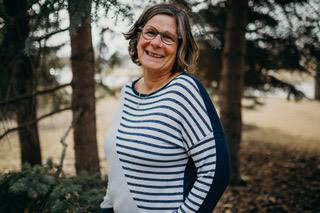Empty sanctuaries
Local places of worship adapt to COVID-19

Kathy Koop, leading minister at First Mennonite Church of Winnipeg.
Over the past year, emptiness has plagued many of Manitoba’s most cherished spaces. Everything from hockey arenas to universities to museums have been closed – or have had their capacities massively reduced – due to the ongoing COVID-19 pandemic.
Places of worship are no exception. These institutions, which provide comfort and hope to many, have had to adapt in order to continue their missions during a time of widespread anxiety and despair.
Manitoban public-health restrictions for places of worship have varied over the past year. They have ranged from reducing capacity to prohibiting in-person services.
Headlines about anti-mask and anti-lockdown churches have dominated much of the discussion about religion and COVID-19. However, many local congregations have been able to adapt while following public-health guidelines.
First Mennonite Church of Winnipeg’s worship services have been exclusively online for most of the pandemic. Kathy Koop, their leading minister, says members of their congregation have been completely supportive of this decision.
“A lot of people in our congregation feel that the church worship services are there to equip them to live their lives throughout the weeks, and we continue to do that in our online services,” she says.
Music has proven to be an effective tool for engaging members of their congregation.
“Lots of people have stepped forward and volunteered to record music (for services),” Koop says, adding that about 70 people have been involved in music-making.
Even now, with public-health restrictions that permit in-person services, the First Mennonite Church of Winnipeg is only offering online events due to safety considerations.
Shaarey Zedek Synagogue has followed a similar approach. Rabbi Matthew Leibl says that, over the past year, his congregation “has not only survived, but thrived.”
“We were lucky, in a way ... since we had already been livestreaming our services prior to the pandemic,” Leibl says. In early 2018, Shaarey Zedek installed cameras in the synagogue as a backup and as an alternative for members of their congregation who might not be able to attend in person.
Currently, their services are exclusively offered online, and in-person events are only held for specific occasions, such as bar and bat mitzvahs.
“We were able to transition seamlessly, and our numbers have been great,” Leibl says, adding that they “lost no momentum” and showed that they were capable of pivoting.
“Religious institutions, stereotypically, are not great at adapting and not great at changing,” he says. “We showed we could, and a lot of our regular people hung with us.”
As of press time, places of worship may open to hold services if “the number of persons attending a service does not exceed 25 per cent of the usual capacity of the premises or 100 persons, whichever is lower” and social distancing between households is in effect.
Attendees, however, are not required to wear a mask when seated and socially distant from members of other households.
Published in Volume 75, Number 24 of The Uniter (May 1, 2021)







